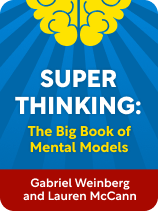

This article is an excerpt from the Shortform book guide to "Super Thinking: The Big Book of Mental Models" by Gabriel Weinberg and Lauren McCann. Shortform has the world's best summaries and analyses of books you should be reading.
Like this article? Sign up for a free trial here.
What is the purpose of a pro-con list? Why is it a bad idea to base your decisions on the simplistic pro-con analysis?
The pro-con list is a decision-making strategy where you sort the advantages and disadvantages of a decision in parallel columns. The pro-con list is probably the most common decision-making tool, but it’s also the most flawed one.
Here is a look at the disadvantages of pro-con decision-making.
The Disadvantages of a Pro-Con List
The pro-con list makes it easier to see the positive and negative consequences of a decision or choice in front of you. For instance, imagine you’re a lawyer deciding whether to accept a higher-paying position that would require moving away from your family. In this situation, you could draft the following pro-con list of accepting the position:
Popularity notwithstanding, Weinberg and McCann argue that the pro-con list has several flaws:
1. It creates a false dichotomy, since many consequences don’t fit neatly as pros or cons.
(Shortform note: The false dichotomy created by pro-con lists is an example of narrow framing, where we constrain our perceptions of outcomes by forcing them into imperfect categories. This narrow framing distorts our perception by casting outcomes as black and white, causing us to ignore nuance and subtleties that might be crucial to our decision.)
2. It fails to weight different pros and cons, so you focus solely on the quantity of pros and cons.
(Shortform note: To mitigate this problem, consider dividing pros and cons into major and minor subcategories. For example, more room for upward mobility could be a major pro, whereas an extra week of paid leave might only be a minor pro.)
3. The grass-is-greener mentality leads us to naturally overemphasize pros.
(Shortform note: While the grass-is-greener mentality inclines us toward decisions that require change, status quo bias—the preference for our current situation over alternatives—inclines us against making decisions which involve substantial change. In such cases, we may be naturally predisposed to overemphasize the cons of change, rather than pros.)
So, while a pro-con list may work well enough for simpler decisions, Weinberg and McCann caution against using it in more complex decisions.

———End of Preview———
Like what you just read? Read the rest of the world's best book summary and analysis of Gabriel Weinberg and Lauren McCann's "Super Thinking: The Big Book of Mental Models" at Shortform.
Here's what you'll find in our full Super Thinking: The Big Book of Mental Models summary:
- How to elevate your everyday reasoning and decision-making skills
- Why you shouldn't rely on intuition when making decisions
- How to deter you opposition from engaging in conflict






